The Soul Felt Its Worth
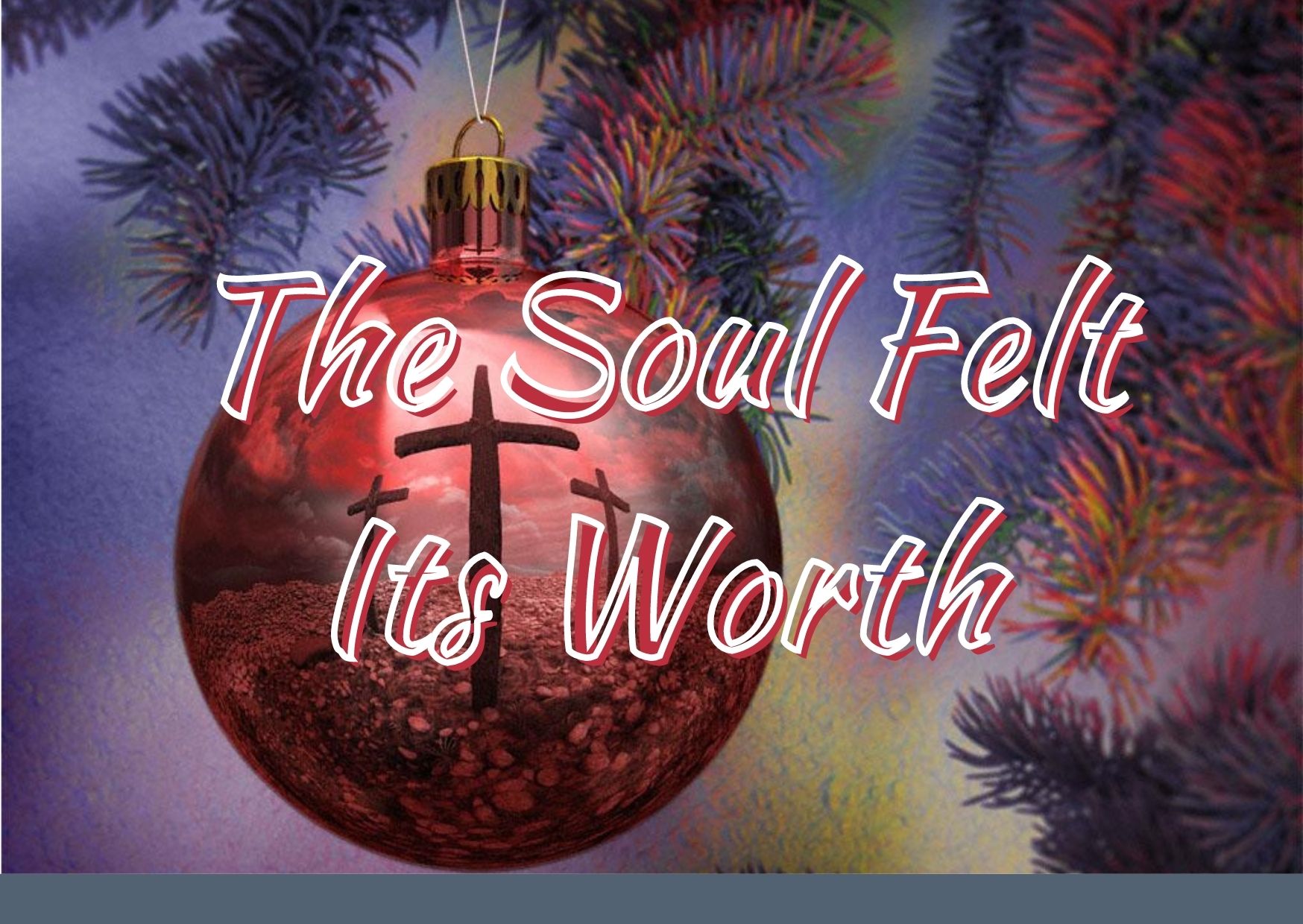
Blog 12.20.2021 2
The Soul Felt Its Worth
Right now, our radios and music players are full of songs that we only hear once a year. These songs are reminiscent of by-gone days like “Jingle Bells” or “Winter Wonderland.” Some are just lighthearted songs of merry-making like the “12 Days of Christmas,” and others come to us as hymns from more than a century earlier. Buried in some of these songs are truths that speak to every person; I suppose that is why we sing and play these melodies and the lyrics year after year. Some of these ancient hymns are rooted not only in the upcoming holiday but the faith of the songwriter. One of these songs is “O Holy Night.” Written by the French poet Placide Chapeau in 1843, it speaks to the redemption that Jesus brought with him as he came to this earth. While I don’t suggest taking every Christmas song as a theologically profound poem, there is a line that resonates with me and one I think should convey a deeper meaning to you as well.
The line is from the first stanza stating, “Long lay the world in sin and error pining- Till he appeared and the soul felt its worth.” We are acquainted with the idea that sin has entangled humanity from the beginning; prompted by the devil, Jesus came to do away with sin. Those thoughts come from “But you know that he appeared so that he might take away our sins. And in him is no sin. … 8 the devil has been sinning from the beginning. The reason the Son of God appeared was to destroy the devil’s work” (1 John 3:5, 8). From the beginning, God made us in His image; that defines us, that was God’s design. However, shortly after, we were represented by another characteristic, sin. Man and woman were the pinnacle of creation and quickly became the curse for the earth. For centuries this is what defined all of the human race; no longer were we the children of God, we were tainted and opposed to His very nature. If you have ever been labeled, you know how damaging it is to be regarded not as a person but as a title. How much worse when the title is unfavorable and degrading. Yet, that is what we were; we all became entrapped in the cycle of sin. However, there was hope; although we were all entangled in sin, fully deserving of wrath, there was the promise of a Messiah. This is how the apostle Paul describes this situation, “Therefore, just as sin entered the world through one man, and death through sin, and in this way death came to all people, because all sinned– … 18 Consequently, just as one trespass resulted in condemnation for all people, so also one righteous act resulted in justification and life for all people” (Romans 5:12, 18). Sin labeled us, and death was inevitable for all people; humanity needed a rescuer performing one righteous act.
This one righteous act provided life for all people, and this righteous act also justifies us. This justification not only removed sin, but it removed the title of “sinner.” Before this moment of justification, we were fully deserving of wrath and God’s righteous indignation, but after this righteous act, our course was changed. A moment of clarification, this righteous act was not being born in a manger but through this death on a cross. Yet, you cannot have one without the other, and a beginning must come before the end (in this case the middle), as his death was not the end. Peter describes this transaction as being redeemed, “For you know that it was not with perishable things such as silver or gold that you were redeemed from the empty way of life handed down to you from your ancestors, 19 but with the precious blood of Christ, a lamb without blemish or defect” (1 Peter 1:18-19). This passage tells us our worth. The precious blood of Christ pays for this justification and redemption.
If I realize that I was once a sinner and deserving of death, as we all were. Yet, we are all redeemed. I can then fully realize how much I am worth. I am no longer a product of Adam, but I am a product of the price paid by the Son of God. We were once wallowing in our sins and transgression, yet now I am aware of how much I am worth. Christ Jesus restored us to our rightful place as the image-bearers of God. Transforming us from sinners to individuals chosen and redeemed. Now we can honestly know our worth, not because of what we have done, but because of what Jesus did for all of us.
“Long lay the world in sin and error pining- Till he appeared and the soul felt its worth.”
Twinkle

Blog 12.13.2021
Twinkle
It is an interesting tradition. I remember helping my dad when I was younger, and now that I have children, they also appreciate the effort and product of the winter routine. The tradition is adorning our house with strands of diminutive lights. The ritual is such a strange thing, and I can only imagine that it has been possible since the invention of the electric lightbulb. It would be dangerous and ineffective to drape candles all around our homes during the coldest and windiest portion of the year. However, I love the tradition because of the enchanted and delightful mood it creates. When the lights turn on, and a soft glow emits from the tiny bulbs, it takes me to a more peaceful, more pleasant state of mind. This year when I had put the final touches on the decorations, my children ran chaotically and enthusiastically around my yard; the excitement and joy were too much for them to try and contain. Squealing and laughing, it immediately filled my heart with delight.
Many cultures over the centuries have worshiped and revered the sun. There were solstice celebrations, and some cultures even offered human sacrifices to encourage the sun to continue shinning. Humans need light. We are drawn to it. It sustains us not only by allowing us to function but also by providing nutrients like vitamin D. Most things on this planet require light to survive (I would say all things, but I am unsure about creatures living in the depths on the ocean floor or dark caves). Because of this, it seems only natural for people to idolize the sun. It is the brightest light, but it also provides life to the earth.
You would expect simple-minded humans to create a deity out of the sun. However, as God reveals Himself in the Bible, he does not present Himself as the sun. Instead, He makes it known that He is the creator of the sun. He speaks, and then light pops into existence. However, God often uses light as a symbol and metaphor for His actions and presence within the world. For the Israelites, as they wandered in the wilderness, He used the pillar of fire to guide them at night (Exodus 13:21). A beacon of providence and safety in an uncertain time in their history. Throughout the Bible, God used light to describe His establishments and activities within the lives of humanity. The Bible references and uses lamps and fire as this symbol of light, and God’s word itself is a symbol of light to His people and the world (Psalm 119:105).
The most important symbol of light connects us with the Son of God. In his gospel, John writes, “When Jesus spoke again to the people, he said, “I am the light of the world. Whoever follows me will never walk in darkness, but will have the light of life” (John 8:12). This statement is enormously significant. Not only is this one of the “ego emi” (I AM) statements of Jesus, thus asserting equality and oneness with the Father. It is also a declaration of one of Jesus’ purposes coming into the world; to shine God’s light into the world and ensure that everyone can also have the light of life. No longer are God’s people to simply follow the light, like the Israelites in the desert, but we can walk in the light (1 John 1:7). Not only this, but the apostle Paul states, “For God, who said, “Let light shine out of darkness,” has shone in our hearts to give the light of the knowledge of the glory of God in the face of Jesus Christ” (2 Corinthians 4:6).
Perhaps this is why I am enamored by these tiny twinkling torches every year. I think of these little lights seeming so insignificant in comparison to the lights that we see every day. One poor light would be a little beacon; however, hundreds of these miniature lamps can light up a corner of the world. Yes, in the darkest part of the year, their luminosity repels the darkness just a little more. They shine in such a way that they bring joy and cheer to an otherwise dismal entryway. This time of year, reflect on this thought about what a little light can do in the world.
Peace on Earth

Blog 12.6.2021
Peace
There is something to be said about this time of year. The days are colder and darker, and the harvest gathering for the year is complete. Hibernating animals have it figured out as they begin their wintery slumber. It can be a difficult time of year to find any semblance of delight. And yet, people are a little kinder and more forgiving all over the world. Someone can cut in front of you in the grocery store, and we extend a little more grace. Although there may be more hustle and bustle during this season, people are generally cheerier and more good-natured. Every year we string out our decorations, or at least we are encouraged to put them up earlier and earlier. I see all of these signs as indications of what humanity wants.
Peace.
Peace is a fantastic concept that is pervasive throughout the Bible. The Old Testament references peace as a courteous greeting, restoration to health, length of life, and cessation from conflict (even in a grocery store). However, it is most often conveyed as a sense of completeness, security, and, therefore, tranquility found in a person’s life. Passages like Psalm 37:37, 119:165; Isaiah 32:17; Proverbs 3:2 inform us that we gain peace when observing God’s ways and walking uprightly. This is because God is described as the originator and giver of peace. When we walk in close connection to God and His Word, we gain a fullness, increased well-being, and serenity that nothing originating in this world can grant. The Aaronic Blessing to the people of Israel expresses this concept well.
Numbers 6:24-26
“The LORD bless you and keep you; 25 The LORD make His face shine upon you, And be gracious to you; 26 The LORD lift up His countenance upon you, And give you peace.”
We all know that the Israelites’ existence was full of conflict and wars. From Joshua and Judges to the end of our scrolls regarding Old Testament history, 2 Chronicles, earthly peace was an elusive concept for the Israelites. So, it is no wonder that peace became an ideal closely tied to the future of the coming Messiah.
Isaiah 9:6-7
“For unto us a Child is born, Unto us a Son is given; And the government will be upon His shoulder. And His name will be called Wonderful, Counselor, Mighty God, Everlasting Father, Prince of Peace. 7 Of the increase of [His] government and peace [There will be] no end, Upon the throne of David and over His kingdom, To order it and establish it with judgment and justice From that time forward, even forever. The zeal of the LORD of hosts will perform this.”
God’s people were eagerly awaiting a time when completeness and tranquility would reign in a physical kingdom. But never fully understanding that we might obtain true peace through God’s laws and presence.
For us today, we realize that peace comes because of Jesus. Through his life and death, we realized what peace is and what it means for us. It is a peace bestowed through the Spirit (Romans 14:17, Galatians 5:22), especially when we don’t feel complete or tranquil. It is a peace in connection with God and the division of Jew and Gentile (Ephesians 2:13-18); the cross ends the hostility between each party.
There is a world that is hungering for peace. Our desire for peace becomes more evident every year. Sadly, like God’s people of old, most of humanity struggle with true peace. Peace becomes a concept that is foreign and unobtainable. Not understanding that true peace, a peace that emanates from within, comes from knowing God and His Son. Some people can attempt to mimic this peace for about a month. Still, eventually, that well runs dry, and they resume their usual tendencies. For the Christian, peace and joy are not token sentiments held for winter activities but something we should radiate every day because of the presence of God in our lives. The world needs peace. The world is craving peace. They desire peace with each other, finding internal peace, and, most importantly, peace with God.
“Glory to God in the highest heaven, and on earth peace to those on whom his favor rests.”
(Luke 2:14 NIV)
Cyber Monday Deal

Blog 11.29.2021
Cyber Monday Deal
We love a good deal. The Air Force took me to a lot of different places throughout the globe. I enjoyed the immersion in a new culture, experiencing the differences between my everyday life and the nuances that other cultures observed. From the markets of South Korea to the souks of Saudi Arabia, they all have one thing in common, and they make a living on the barter system. The price negotiation places a lot of responsibility on the customer. As a customer, you need to know the approximate value of the item; whether it is a hand-stitched blanket or a gold necklace, a person needs to comprehend the value of the object to negotiate effectively. You have to know the value of the materials used and the amount of time an artisan would have spent on the item. Then you have to inspect the item to ensure there are no impurities or inconsistences in the material (some even take a magnet to make sure something isn’t gold plated). A cheap counterfeit item can ruin even the best deal.
However, in our culture, we don’t like to barter for our goods. We want to see a reasonably priced item that we believe has a fair-marketed value, and then we make our purchase. In a system like this, there creates an attraction to a thing going on sale. We believe that all prices are appropriate and fair and that when it goes on sale, we are getting a better deal than if we bought it on a particular day. Shopkeepers in these other cultures caught on to our bartering ineptitude. And they began calling out attention-grabbing slogans from their storefronts to attract these westernized customers. My favorite instance of this tactic that I ever heard was, “Nearly free blanket!” Everyone loves a deal, and what is a better deal than getting something for “nearly free”? The deal was not nearly free, but it would grab your attention enough to get you in the door, and that is where negotiations could begin.
All of humanity has entered into negotiations. We attempt to comprehend the value of certain items and try to exchange them for our benefit. Naturally, we want the best deal for a reasonable price. However, we have been hornswoggled, bamboozled, and tricked; the great deceiver has made us pay too high of a price for a counterfeit life…
Romans 6:17-23
“But thanks be to God, that you who were once slaves of sin have become obedient from the heart to the standard of teaching to which you were committed, 18 and, having been set free from sin, have become slaves of righteousness. 19 I am speaking in human terms, because of your natural limitations. For just as you once presented your members as slaves to impurity and to lawlessness leading to more lawlessness, so now present your members as slaves to righteousness leading to sanctification. 20 For when you were slaves of sin, you were free in regard to righteousness. 21 But what fruit were you getting at that time from the things of which you are now ashamed? For the end of those things is death. 22 But now that you have been set free from sin and have become slaves of God, the fruit you get leads to sanctification and its end, eternal life. 23 For the wages of sin is death, but the free gift of God is eternal life in Christ Jesus our Lord.”
I love how Paul frames this thought. He reflects on Jesus’ statements about serving two masters (Matthew 6:24) and brings it to a necessary conclusion. We are all slaves to either sin or God. If you choose to make in your master, you are free from righteousness and living a life that is pleasing to God. However, Paul warns us that this choice has a high price tag; its end is death. There is another option; it is a life that has chosen to “become obedient from the heart” and produces a far different result. The first option is a life hostile to God and a slave to sin, you can pay for this life, but it will be expensive. It will cost you your life. Or you can choose to enslave yourself to God, and you will receive a free gift. The free gift of eternal life in Jesus.
Paul’s terminology is exceptional; you either pay for a life of sin with your own life or receive a gift that you don’t deserve. Which deal would you take? Is free a good enough price for eternal life? Do you understand the value of what is being offered? We would make far different choices if we understood the free gift of God.
May I Have Another
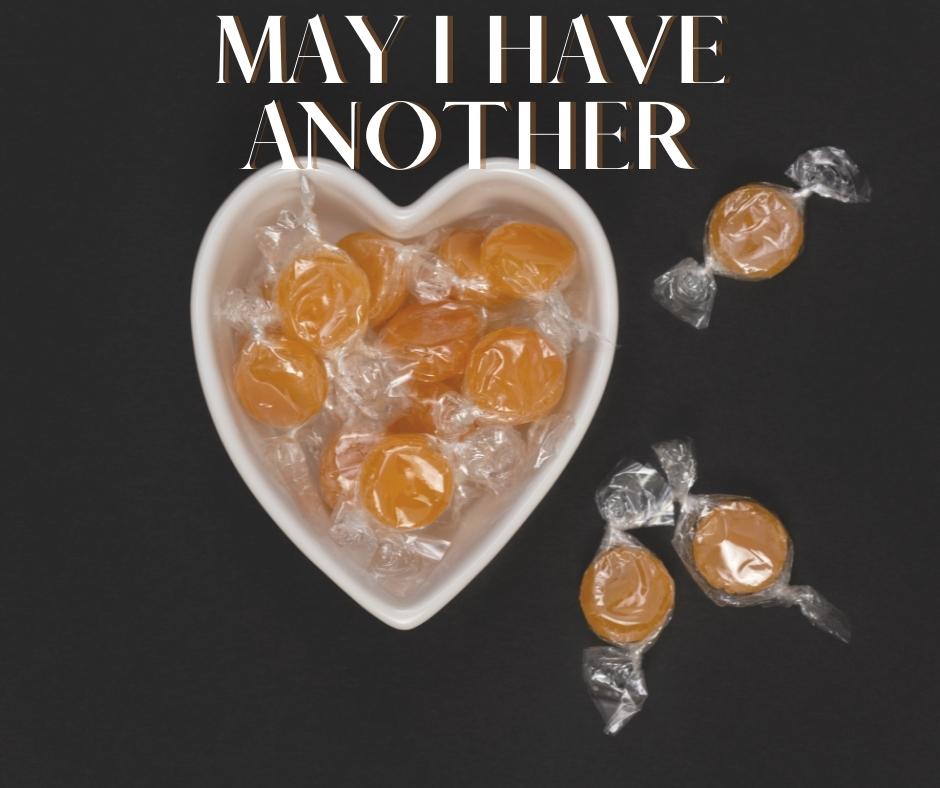
Blog 11.15.2021
“May I have another?”
There’s a problem in our house. It all started on October 30. First, we had our Truck or Treat, and then on the following day, we took our kids Trick or Treating, and now we have a large amount of candy. Having too much candy creates a few problems; for starters, I have a sweet tooth and enjoy snatching a few morsels whenever I remember we have a seemingly unending supply. The second problem is that I passed this sweet tooth on to my sons. The other day I opened their bag of candies, and before I knew it, they had eaten several pieces before I realized what was happening. If they have one piece, they immediately ask for a second or third. This is only a problem if I don’t want my sons to be full of sugar and consequently excess energy, which I typically don’t want to happen. So, we make some rules for them about how often and how much they can eat. Because sugar tastes good, but in large amounts, it is not the best thing for us. And no matter how much you eat, it never fills you up.
(Isaiah 55:1-3 ESV)
“Come, everyone who thirsts, come to the waters; and he who has no money, come, buy and eat! Come, buy wine and milk without money and without price. 2 Why do you spend your money for that which is not bread, and your labor for that which does not satisfy? Listen diligently to me, and eat what is good, and delight yourselves in rich food. 3 Incline your ear, and come to me; hear, that your soul may live; and I will make with you an everlasting covenant, my steadfast, sure love for David.”
Through His prophet Isaiah, God is calling out for His people to return to Him. This passage tells us that there are things in this world that will never satisfy us. Oddly enough, we are willing to spend our money and resources (labor) on things that bring us no benefit. If we are honest, these objects and ideas can bring us great harm. We consume and consume without ever realizing what we are doing to our physical and spiritual health. Sadly, they often bring us brief moments of pleasure, but that is vain and fleeting. Like copious amounts of candy, it can leave us sick and even suffering from an energy crash. Some can ruin their spiritual lives, like an individual that no longer produces insulin the way it should. They leap from one gratifying sensation to the next, consumed by instantly gratifying their desires.
However, this passage produces imagery that is contrary to our previous scenario. We are told of a God that invites us into a rich and satisfying life. God promises us that this is something that will cost no money. Returning to God will satisfy us to the core of our existence as it poetically states, “that your soul may live!” Not only will it fill us, but it will taste good!
Some so many people do not understand or partake in this promise. They have no idea what it means to trust in God and be satisfied. They will continually be chasing one sensation, experience, or seductive moment to the next. They will wonder why they can never stop or why they feel empty.
A fantastic concept about this passage is that God does it because He wants to. It is His nature to give us what will truly satisfy. That is His purpose, and that is what will not come back empty. He does this because of His goodness and great compassion.
One final thought, read the end of the chapter v. 12-13.
“For you shall go out in joy and be led forth in peace; the mountains and the hills before you shall break forth into singing, and all the trees of the field shall clap their hands. 13 Instead of the thorn shall come up the cypress; instead of the brier shall come up the myrtle; and it shall make a name for the LORD, an everlasting sign that shall not be cut off.”
Because of the goodness and compassion of God to those who thirst, He quenches. And when He quenches our thirst, it will be as though the earth is singing and rejoicing. Therefore, being filled is not a promise that life will never have troubles or struggles, but that the goodness and compassion of God will fulfill you, and your outlook on life will change because you are changed.
(1 Timothy 6:6-7 ESV) “… godliness with contentment is great gain, for we brought nothing into the world, and we cannot take anything out of the world.”
Splitting Heirs
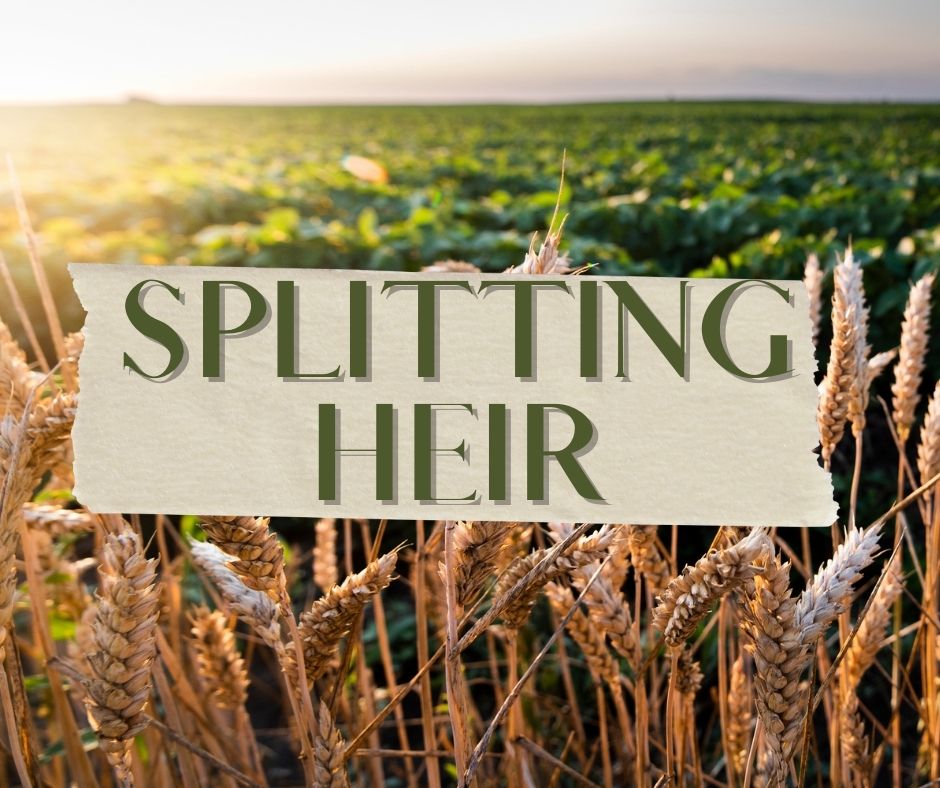
Blog 11.8.2021
Splitting Heirs
A few weeks ago, my kids and I went to visit our family in Idaho. It is always a great time; we get to spend time with their aunts, uncles, cousins, and of course, grandparents. However, this time there was an unintended consequence. Theo started calling me “Uncle Tom”. He has always adopted nicknames for me; for a long time after he first watched Disney’s, The Incredibles, he called me “Bob” after the dad in that movie. To my nieces and nephews, I am their fun uncle Tom, and that’s great because I am a fun uncle; however, to Theo, I am his dad, and being a dad means I am more than just a fun person. Dads are not uncles; dads have boundary-setting roles and are in charge of terrible tasks like getting ready for bed at night. It was difficult for Theo to know which relationship “hat” I was wearing. It can be troublesome to define our earthly relationships, and it can be even more challenging to understand our spiritual relationships.
In our study on the parable in Luke on Wednesday nights, we covered the narrative of the Lost Son. Contained at the end of the parable, there is a struggle illuminated by the older son; he is unaware of how to define his relationship with his father. But, first, let’s look at the words of the masterful parable teller.
Luke 15:25-32
“Meanwhile, the older son was in the field. When he came near the house, he heard music and dancing. 26 So he called one of the servants and asked him what was going on. 27 ‘Your brother has come,’ he replied, ‘and your father has killed the fattened calf because he has him back safe and sound.’ 28 “The older brother became angry and refused to go in. So his father went out and pleaded with him. 29 But he answered his father, ‘Look! All these years I’ve been slaving for you and never disobeyed your orders. Yet you never gave me even a young goat so I could celebrate with my friends. 30 But when this son of yours who has squandered your property with prostitutes comes home, you kill the fattened calf for him!’ 31 “‘My son,’ the father said, ‘you are always with me, and everything I have is yours. 32 But we had to celebrate and be glad, because this brother of yours was dead and is alive again; he was lost and is found.’ “
At first glance, we see a dutiful son who is taking care of the family’s property. But then, we wonder why he is so bitter, what makes the older son upset at the party at his house. I believe his bitterness is partially due to misattributing the wrong relationship titles between his father and him.
He doesn’t go to address the father directly. Instead, he chooses to talk to a servant, depicting a strain on the roles of the father/son relationship. Then there are the other classifications he uses in his response to his father; words like slaving, orders, and referring to his lost brother as “your son.” These demonstrate that the older son was assuming the role of a second-class citizen. He thought himself to be unworthy within the walls of his own home. The older son was obedient and dutiful because he viewed himself as a servant working on his father’s property. He did not consider himself as a son.
The father in the parable quickly corrects this problematic thinking by referring to him as, “My son.” And informing him of his rightly secured his place in the family, not because of diligence and performance but because he was a son.
How do we have a wrong assessment of our relationship to God? Are we working because we feel an obligation? Do we work because we are a son and share in the prosperity of the family? To be sure, those who have the Spirit living in them can rightly call God their Father, God adopting them into the family. Additionally, this transformation should change the way we interact and view the Father. Much like Theo realizing there is a difference between the role of an uncle and a dad. There are differences in calling God our Father; expectations might change, but so do the benefits of being a family member. However, that takes a reassessment of our place within the family.
Galatians 4:6-7
“Because you are his sons, God sent the Spirit of his Son into our hearts, the Spirit who calls out, “Abba, Father.” So you are no longer a slave, but God’s child; and since you are his child, God has made you also an heir.”
Clothed

Clothed
It is always a busy day on October 31st in our household. Part of me loves the chaos of celebrating a birthday that coincides with Halloween, it is full of fun and copious amounts of sweets. However, it can also be draining because the day almost has too much fun and copious amounts of sweets. I know my children love it. What could be better than a day where you get to dress up in a costume, knock on neighborhood doors, and get rewarded with sugary goodness? Add cake and presents, making for one of the most fantastic days of the year. It is fascinating watching my children dress up; they dream of putting on their costumes and love to be someone else for a few minutes. Their imaginations transform them into their new personas. One magically morphs into Spider-Man, including web slingers and jumping ability; another becomes the Hulk with smashing success. It becomes almost disrespectful to refer to them in their given names. For a few hours, they are not my children, they are superheroes, and the world needs saving from an abundant amount of candy, and there aren’t enough people to consume it.
Being a follower of Christ and living in the world is not an easy task. Everything we do appears to be at odds with pressures to conform and perform in a culture and society that often rejects if not attacks those who live out redeemed lives. Numerous passages instruct us to “clothe ourselves” or “put on” garments and attires while we live in the world. Part of this is how we refer to ourselves, as we see in the letter to the church in Colossae.
Colossians 3:8-12
“But now you must also rid yourselves of all such things as these: anger, rage, malice, slander, and filthy language from your lips. 9 Do not lie to each other, since you have taken off your old self with its practices 10 and have put on the new self, which is being renewed in knowledge in the image of its Creator. 11 Here there is no Gentile or Jew, circumcised or uncircumcised, barbarian, Scythian, slave or free, but Christ is all, and is in all. 12 Therefore, as God’s chosen people, holy and dearly loved, clothe yourselves with compassion, kindness, humility, gentleness and patience.”
We do not live in that old life any longer. The world will try to say that this is who we are; however, we know that is only how we used to be. I also appreciate Paul tells us to take off the old self. There is no going back; this is not a costume for us to wear when convenient or practical. The new creation is who we are to be all of the time. It is also appropriate to note that this is putting on and clothing ourselves with our new life. It is not standing adjacent to it or simply keeping it close by. We are made new.
Another passage reflecting this thought comes in Ephesians 6. Again, Paul denotes the actual situation engaging all Christians. It is not a fictitious diversion meant to distract us from our everyday lives.
Ephesians 6:12-18
“For we do not wrestle against flesh and blood, but against the rulers, against the authorities, against the cosmic powers over this present darkness, against the spiritual forces of evil in the heavenly places. 13 Therefore put on the whole armor of God, that you may be able to withstand in the evil day, and having done all, to stand firm. 14 Stand therefore, having fastened on the belt of truth, and having put on the breastplate of righteousness, 15 and, as shoes for your feet, having put on the readiness given by the gospel of peace. 16 In all circumstances take up the shield of faith, with which you can extinguish all the flaming darts of the evil one; 17 and take the helmet of salvation, and the sword of the Spirit, which is the word of God, 18 praying at all times in the Spirit, with all prayer and supplication. To that end, keep alert with all perseverance, making supplication for all the saints.”
The items listed are battlefield implements; they are only helpful if we put them on. We cannot stack it up in a corner and imagine it will protect us or be of much use in our bedroom. We are to put it on and clothe ourselves with them. How many Christians think it is too cumbersome to wear? How many people believe it is unnecessary to put on? Nothing is wearisome about truth, righteousness, preparedness, faith, the Word of God, or our salvation. These are our daily accouterments. These are the daily reminders of our situation and our portion in this world.
It is tempting to play a Christ-follower. To think we can take on and off the very things that benefit our lives. It is convenient to want to remove it when we feel the situation calls for it. However, this is not a costume. We have given up the old self. Instead, we clothe ourselves with the new creation. Being a Christian is not “dress-up”; it is our true, authentic self.
Shine A Light
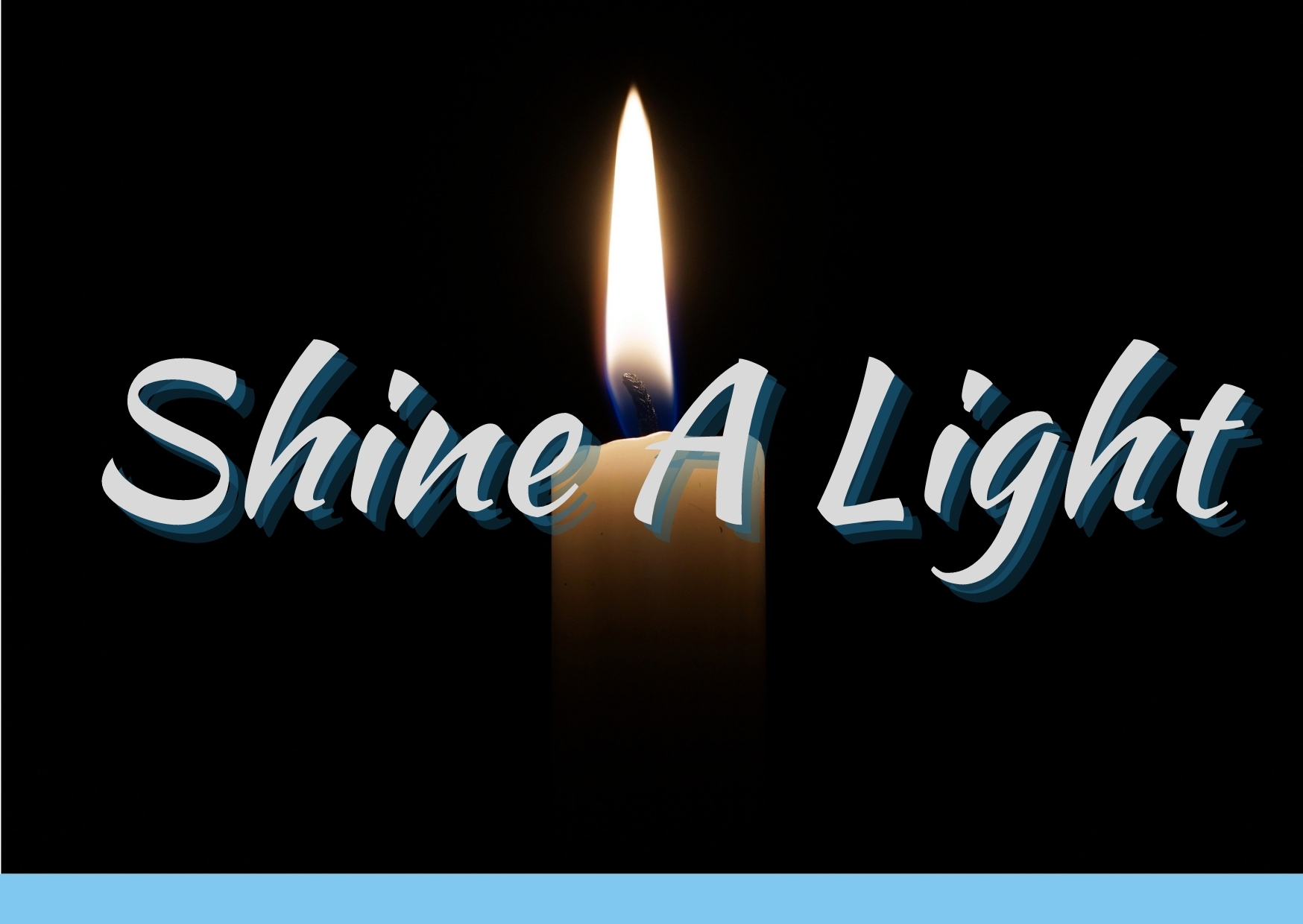
Shine a light
There is a phrase forever entrenched in my memory, “Shine the light where I’m working, not in my eyes.” It is almost a rite of passage for a young boy working with his dad. Whether we were in the engine compartment of a car, under a sink, or just fixing something in the dark, this phrase was repeated for every project we worked on together from when I was 4-12 years old. Now that I’m a dad, I feel almost compelled to say it, partly for instruction and partly because it’s good advice that shapes us. I know why it happens. For starters, young people have short attention spans and forget that they are even holding a flashlight. Secondly, it’s dark, so the adult needs only to see where they are working; everything else is irrelevant at that moment. Finally, the adult speaks, and the child wants to see their parent’s face, read their expression, and see the totality of what the father wants to convey. All of this climaxes with the phrase, “Shine the light where I’m working, not in my eyes.”
This week, in our lesson, we looked at what the lampstand means in the Revelation given to John. We discovered John equates churches to being lampstands. Three passages immediately pop into my memory; two from the Sunday morning lesson and a third from Jesus’ Sermon on the Mount.
Exodus 25:37
“Then make its seven lamps and set them up on it so that they light the space in front of it.”
Revelation 2:2
“I know your deeds, your hard work and your perseverance. I know that you cannot tolerate wicked people, that you have tested those who claim to be apostles but are not, and have found them false.”
Matthew 5:15-16
“Neither do people light a lamp and put it under a bowl. Instead they put it on its stand, and it gives light to everyone in the house. 16 In the same way, let your light shine before others, that they may see your good deeds and glorify your Father in heaven.”
Being a part of God’s Church, His community of believers, is lived out in actions of hard work and perseverance. When we do these things, it is the equivalent of shining a light where God is working. This is a two-fold process; shining and working combines their efforts in one deliberate action. We become co-workers with God in His endeavors by “work-shining.” This is our responsibility when we are a lampstand. It might be easier to protect the light and put it under a bowl; however, that negates the purpose and function of light. In other words, it doesn’t shine the light where the Father is working.
Our purpose as lampstands is not to shine the light for God to see; that is seeking glorification for ourselves; remember God sees what we do regardless, “Then your Father, who sees what is done in secret, will reward you” (Matthew 6:4). Instead, we want to shine a light for God’s work to be done. To be an example to the world of the goodness and glory of God. Shining a light requires us to be attentive to the Father’s plan; if I know what He is doing, I can shine the light more purposefully; I don’t have to second-guess His designs; this frees me to participate in the Divine reality.
When we act in this manner, the world will recognize this light and be drawn into it, and they will see this goodness and give glory back to God. So then, the only thing left for us to do is “Shine the light where the Father is working.”
Blame Game
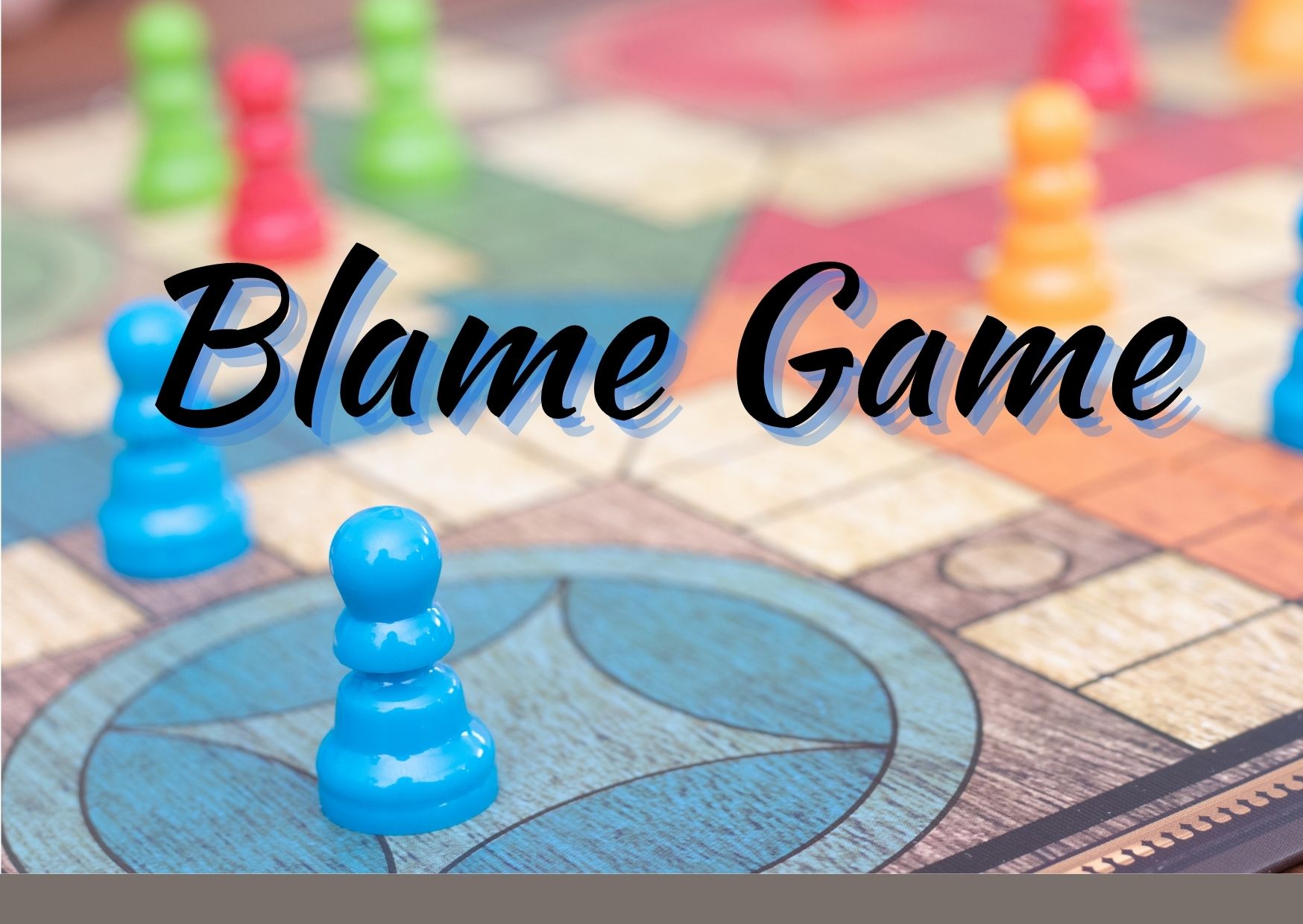
Blog 10.18.2021
Blame Game
The other day I asked my oldest son to pick up the toys on the ground in his room, his room was an absolute mess, and there was barely any room to walk around it. He replied, “I didn’t play with those toys.” His statement might have been true (probably wasn’t), but it had nothing to do with my request. I asked him to clean his room, not tell me why he isn’t responsible for the messy room. It is amusing how we excuse ourselves when we feel we are not personally liable for a situation. We justify our actions by placing the responsibility in someone else’s corner. We place the responsibility on the government, corporate structures, and our present culture. More often than not, we like to blame other people or other groups of people. We like to create a group of people with flaws or negative characteristics and vilify them. This concept is not new; it is the shifting of responsibility, and it has been happening from the beginning of humanity. Shifting responsibility is the easier route; you blame someone else and move on with your life. If you want to be truly nasty, you might call them a name or even hate them, but that doesn’t clean up the mess.
2 Corinthians 5:14-17
“[…] Christ’s love controls us. Since we believe that Christ died for all, we also believe that we have all died to our old life. 15 He died for everyone so that those who receive his new life will no longer live for themselves. Instead, they will live for Christ, who died and was raised for them. 16 So we have stopped evaluating others from a human point of view. At one time we thought of Christ merely from a human point of view. How differently we know him now! 17 This means that anyone who belongs to Christ has become a new person. The old life is gone; a new life has begun!”
Following Jesus is a complicated endeavor. This passage presents us with the notion of “dying to self,” putting away our selfish desires and worldly way of thinking. Putting off our selfish ways is complicated because we often don’t realize how our motivations are self-seeking. We want to preserve our lives and comfort at all costs; we contend for prestige, power, and profits. No matter how decent or admired these values are by the world around us, these motivations are selfish and unfruitful. We will follow Jesus as long as it doesn’t upset my current way of life. This mindset is where my son was; he did not want to stop playing and clean up his room, so he deferred to it not being his mess. The challenging route is doing what you can to get into the mess and start cleaning. The easy way is to blame someone else and move on with your current life.
Throughout God’s word, there is the element of personal responsibility, and this is pure wisdom and fundamental to godly living. God is unconcerned with power struggles, political agendas, or whose fault it is; sometimes, it is no one’s fault at all. In our present culture, there is a lot of emphasis on finding out who made the mess or getting the right person to clean up the problem; the mess never gets addressed. Therefore, God wants each one of us to die to ourselves and live for Him individually. Take a look at this passage from Jeremiah:
Jeremiah 10:23-24
“O LORD, I know the way of man is not in himself; It is not in man who walks to direct his own steps. 24 O LORD, correct me, but with justice; Not in Your anger, lest You bring me to nothing.”
This verse addresses that it does not lead to godliness if we make our own course. Our methods are self-seeking and selfish; Jeremiah says we should allow God to look at our steps with justice and correct our actions to bring our efforts in alignment with His steps. This direction is the only way we can truly clean up the messes around us. Left to our own devices, we will make excuses and blame someone else. We will blame the system, blame the government, blame agendas; however, Jesus lived in a place and time that was entirely hostile for his teachings in every facet. Yet, he was able to cut through that social, religious, and governmental disorder and heal the sick, blind, poor, and lame. He did this by accepting personal responsibility for a problem he did not create and carrying the cross. Let us not live for ourselves but live for Christ.
Think About It

Blog 10.4.2021
Think about it.
Navigating the world is complicated. We gain many things in life through experience alone. We might not always know why we do something, but we probably learned that this was the best choice given all options available. Take Theo, for instance; the seasons have changed, we know the cold weather dictates what clothing is best for the situation. Amanda and I like to give him options for the clothes he might want to wear for the day. We’ll ask him, “Do you want a long sleeve shirt, or a short sleeve shirt and a jacket?” He replies that he wants to wear his swim shirt and swim trunks. We informed him that it is too cold for that, and we only use those items when we are playing in the water, which is also too cold to do. He insists because he wants to go swimming and believes it is almost guaranteed to happen if he puts on swimming clothes. He does not have the experience to know that running around in the cool weather in swimming clothes will be uncomfortable and miserable. It might be fun for a little bit, but it will be worse in the long term. As we grow older, we realize that to make some choices, we have to know the entire situation and consider if we can endure it for the whole day or longer.
Sometimes in my studies, all of the various study preparations perfectly coincide and dovetail. I like to call it my serendipitous moment. There are moments when I could force it, but there are times when it does all come together nicely, and I gain a glimpse of the network of truth laid out in scripture. A few weeks ago, my preparation brought me to this fantastic conglomeration of scriptures.
Healing at the Pool of Bethesda
- John 5:1-15
Seeking and Saving the Lost
- Matthew 18-10-20
Counting the Cost
- Luke 14:25-35
On the surface, these might not seem to fit, at least not by the titles provided. However, as I studied, it solidified the wisdom contained throughout scripture. These passages solidify the understanding that we are all given a personal choice to follow Jesus.
Let’s begin with the text from our assembly on Sunday morning.
Matthew 18:10-20
- Seeking and Saving the Lost
- Two Groups
- Those who will listen vs. 15
- Those who will refuse to listen vs. 17
- Two Groups
We spoke of seeking the lost within our assembly, the church before they have wandered away. The impetus is to turn those who know the truth away from sinning and return to their way of life before they found Christ. We discovered that the responsibility lies with the one that needs to repent and change. So first, Jesus informs his followers to go privately, then with a few witnesses, and finally the entire church to help the struggling disciple. The overall responsibility to change and return is not by coercion or force, but the choice remains with the one who committed the transgression.
Then as I studied for the Young Adult Class, we looked at the account of the Paralyzed man near the pool of Bethesda.
John 5:1-15
- Suffering person
- He has no way to take care of his infirmity
- Jesus asks him, “Do you want to be made well?
The old King James puts it, “Do you want to be made whole?” Is this not the question that every person must answer? Is this not the point of the Good News? Do you want to be made whole? Sadly, many don’t want to be made whole or are concerned that the trade-off is too steep. They rather like the existence they have carved out for themselves, even if the choice is waiting indefinitely by a pool for the waters to be “stirred”. So, once again, we must make a choice. Do we want to be made well?
Then during the Wednesday night class, we were reading Luke 14 concerning the parables of Jesus. So again, Jesus places a significant responsibility or ownership on the weight of being a disciple.
Luke 14:25-35
- Counting the Cost
- Three times Jesus says, “Cannot be my disciple.”
- Twice he states, “Sit down and estimate the cost/consider”
Although Jesus has a large crowd following him, he does not want the casual follower to remain uninformed. Being his disciple or follower will be challenging, and there is a specific cost that we all must consider. He does not want anyone to enter into Christianity, unaware that there will be times when the price will be more than some can bear. Each of us has to reason within ourselves, I cannot choose others, and they cannot make a choice for me. When presented with the tough choice, they will walk away sorrowfully like the “Rich Young Ruler” found in Luke 18:18. Others will be commended for being a “good and faithful servant”, emphasizing the word faithful.
Buried within these passages is a challenge and compliment for each one of us. Jesus challenges us to count the cost and estimate if we can endure until the end. If we are presented with shortcomings, we heed the advice of others and change our ways. It is also a commendation to know that we have endured so far. Jesus gave us the option to be made whole, and we said, “Yes!” We have counted the cost, accepted the terms, and are the salt of the world. We have reasoned that following Christ is the best option, it might not be like running around in swim clothes, but it will be better for us in the long run. This week reevaluate the cost, genuinely think about it, count yourself blessed that you have been made whole, and endure to the end.
A Worthy Life
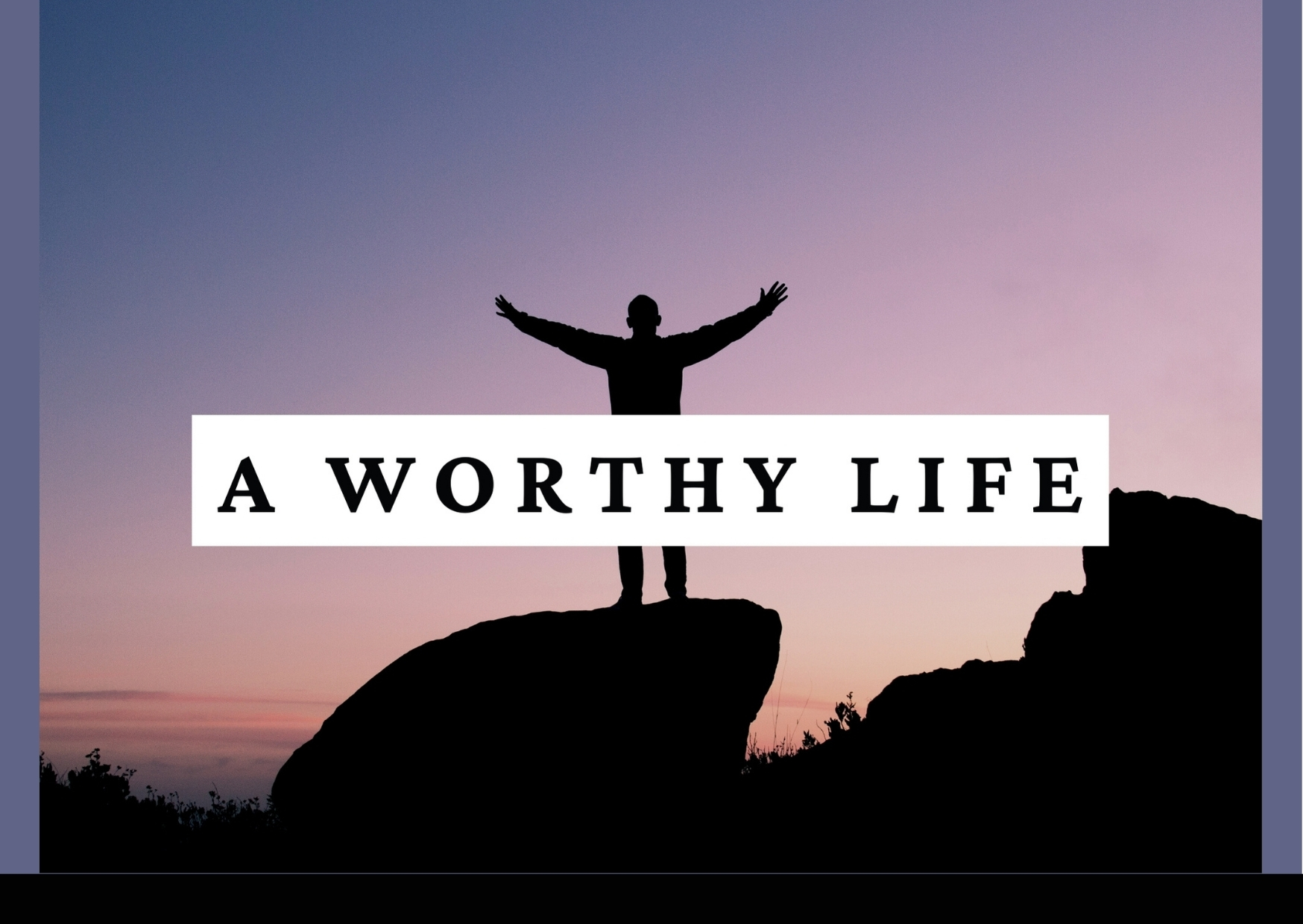
Blog 9.27.2021
A Worthy Life.
The other day I was scrolling through my browser’s newsfeed, and I came across this article, “You Are Worthy of Living Your Best Life.” These internet essays have two primary purposes: to make us feel warm and fuzzy inside and empower us to achieve more personal happiness. This kind of writing causes me to bristle and reject it from the inside out. First of all, it is entirely subjective; what does it mean to “live your best life?” What if your best life is stealing from other people? Does this make it a good life, or one that someone should be worthy of living? What if your best life hurts people; is that something that we should celebrate? Slipped into this line of reasoning is that personal happiness should be everyone’s end goal. Although this may make some people feel better, it does not benefit everyone and can cause some extreme pain, disappointment, and disillusionment with the world around us. Because if things don’t go my way, and I end up unhappy at some point, then I must not be worthy.
Understanding worthiness begs the question, “What does it mean to be worthy?” Am I worth someone’s time, energy, resources? Does my life have any worth, meaning, or purpose? If these questions go unanswered or unfulfilled, it has damaging effects on our outlook on life. Consolidating our lives to whether or not we are happy and worthy is a dangerous mental trap, a tragic situation where only a few people can be happy and worthy.
Thankfully, this is not the message relayed in the Bible. Take a look at a passage we read on Sunday:
Ephesians 4:1-6
As a prisoner for the Lord, then, I urge you to live a life worthy of the calling you have received. 2 Be completely humble and gentle; be patient, bearing with one another in love. 3 Make every effort to keep the unity of the Spirit through the bond of peace. 4 There is one body and one Spirit, just as you were called to one hope when you were called; 5 one Lord, one faith, one baptism; 6 one God and Father of all, who is over all and through all and in all.
This passage comes after Ephesians 3:14-21, which is a great prayer that I encourage you to read later. This prayer highlights just how amazing the love of Christ is and how this unites us under God the Father. After this prayer, Paul instructs the church in Ephesus to “live a life worthy” of their calling. This phrase denotes a few things, 1.) they have already been deemed worthy and now 2.) live like they are worthy. This clarification removes the questions we posed earlier, am I worth someone’s time, energy, resources? Yes! You are worthy; God has given us time, life, and His own Son to demonstrate our worthiness. How do we live a worthy life? We live it contrary to the ways of the world. We become completely humble and gentle, we are patient with each other, we bear with one another in love, and we make every effort to keep the unity of the Spirit. Living like this is in direct opposition to pursuing our happiness or our best life; this is putting other’s needs above my own. Living in this manner puts Jesus’ calling above my fulfillment.
Paul informs us in Philippians 2 that a life like this will make his “joy complete”, and I believe this joy can be ours as well if we live this worthy life. We can either live in such a way that only takes care of our happiness, which is a dangerous gamble, because we might never achieve our ideal level of happiness, or because happiness is fleeting. Or we can discover complete joy by looking out for the needs of those around us. So, my challenge for you this week is not to try to strive for an unattainable “best life” but to instead let us all “Live a Worthy Life.”
Hungry

Hungry?
It is different for both of my older boys, although they both do it. They both love a type of food, yet it never seems to fill them. For Theo, it is any bread, rolls, muffins, donuts, etc. This last weekend Amanda went to Bunko with the other women at church, and I got the boys the special treat, pizza. That night I witnessed it for Cooper; he ate all by himself close to three slices of pizza. That is a lot for anyone, but for a tiny little boy, it was impressive. I kept cutting it up, and he kept eating; I eventually just had to put a stop to the consumption. We live in a time and place where the question of food is not “If?” but “How much?” Our current food situation is a rare time in the world and history where food is so accessible that we don’t wonder where our next meal will come from, but what will it consist of, and will I enjoy it? We wonder, “Will it satisfy me?”
I noticed a common Biblical theme lately. Jesus references it often, and I encountered it in two separate and unrelated studies. It pertains to food and satisfaction. Here are the unrelated yet incredibly related verses.
“Meanwhile, his disciples urged him, “Rabbi, eat something.” 32 But he said to them, “I have food to eat that you know nothing about.” 33 Then his disciples said to each other, “Could someone have brought him food?” 34 “My food,” said Jesus, “is to do the will of him who sent me and to finish his work” (John 4:31-34).
“For life is more than food, and the body more than clothes.” (Luke 12:23)
Whenever we read the words of Jesus, we have to ask ourselves this question, “Is Jesus the exception or the rule? If he is the exception, then I can dismiss it as impossible, but if he is the example, I must believe and commit to his way of living. According to 1 Corinthians 11:1, we are to use Christ as our example; so, Jesus is never the exception; his life and conduct will always be the rule.
Jesus states that his food is doing what God sent him to do and to complete that work. Doing what pleases God is what fills and sustains Jesus. The thing that provides life and energy for Jesus is not consuming food but committing our lives to God. So many people live from meal to meal, hobby to hobby, and purchase to purchase. I think we know that simply consuming anything does not bring about happiness, contentment, and it will not sustain you. I believe that when Jesus mentions that he has food that the disciples don’t know about, he is referencing Deuteronomy 8.
(Deuteronomy 8:1-3)
“Be careful to follow every command I am giving you today, so that you may live and increase and may enter and possess the land the LORD promised on oath to your ancestors. 2 Remember how the LORD your God led you all the way in the wilderness these forty years, to humble and test you in order to know what was in your heart, whether or not you would keep his commands. 3 He humbled you, causing you to hunger and then feeding you with manna, which neither you nor your ancestors had known, to teach you that man does not live on bread alone but on every word that comes from the mouth of the LORD.”
Moses relays this concept well; if you want to live and increase (thrive), do God’s will. The time of wandering in the desert wasn’t strictly a punishment, and it wasn’t because Moses was lost; it was because the Israelites needed to understand what it means to rely upon and trust in God. Don’t be upset with the Israelites, because for many, it takes more than 40 years to trust in God completely. Forty years to know that God fulfills and sustains, not the Egyptians or their own hands; it is God that provides and satiates.
Our hearts are always in the “wilderness,” we should constantly assess whether or not we will keep God’s commands. Will we cling to God’s word as they contain the essence and gift of life?
Like the Israelites in the desert, God provides us with food from above. We can either say that God sustains us or that we have provided sustenance for ourselves. The areas of your life where you determine that God can’t satisfy you; you will attempt to gratify yourself, and you will discover that these things can never fulfill you. Like my boys that seem never to be full of bread or pizza, the world will never be enough for anyone, and it will only leave each one of us hungry for more. Yet, there is a food that the world knows nothing about, and it is a food that fully satisfies. Food that the world doesn’t know about is that when we trust and rely on God, we will be satisfied indeed.